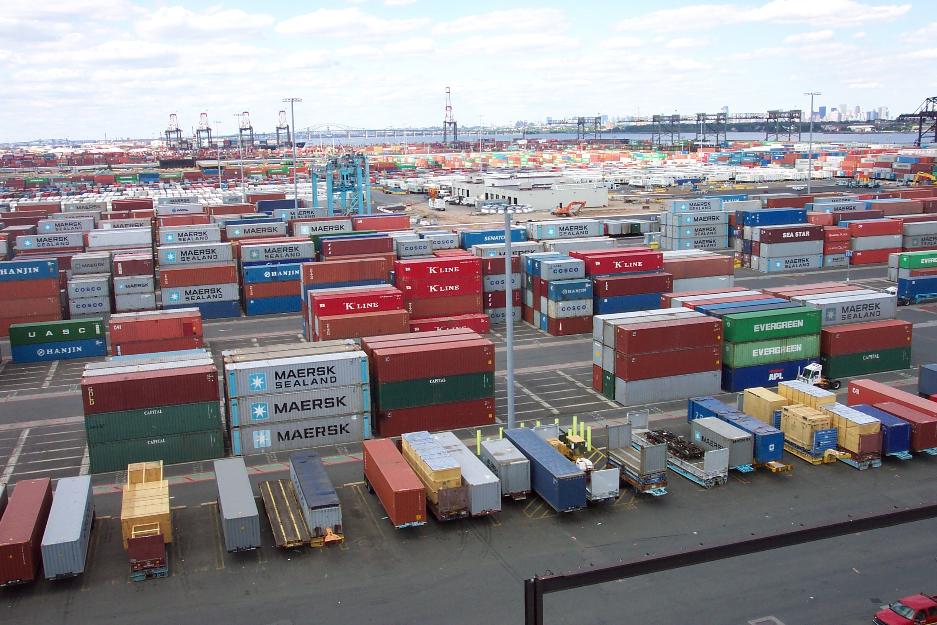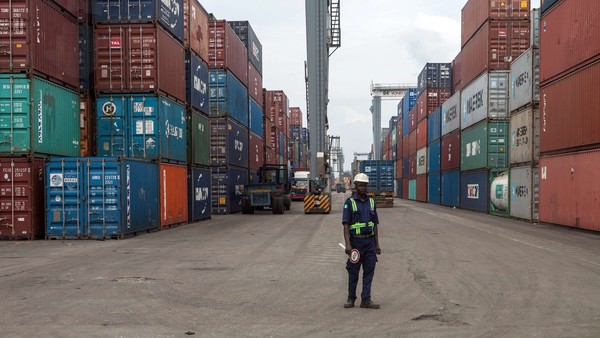
Maggie Fick | Financial Times /
Nigeria’s Apapa port is usually a frenetic place, where ships line up for days to offload imports ranging from used cars and plywood to rice, frozen fish and champagne. Snaking queues of trucks are usually waiting for the cargo. But the busiest port in Africa’s biggest economy has become eerily tranquil in recent months. Even the women who sell lunches of soup and pounded yams to customs officers and dock workers have mostly stopped turning up.
“Apapa is so empty now that in the evenings you will find security guards playing football in the container yards,” says a frustrated clearing agent at the port, a sprawling site in Nigeria’s commercial capital Lagos that sits near the mouth of the lagoon from which the city gets its name. The country’s top shipping executives and customs officials voice similar concerns.
To stem an ongoing fall in foreign reserves caused by the oil price crash, Nigeria’s central bank introduced restrictions last summer that have effectively blocked imports of hundreds of items that typically enter Nigeria through its ports.
The policy, backed by President Muhammadu Buhari, also aims to boost local manufacturing and agriculture. The country has long used its oil revenues to bring in essential items such as steel and palm oil that the Buhari administration says should be made locally.
Yet in the short term the policy is forcing local manufacturers to cut operations and lay off workers because they cannot import the raw materials they need to make goods.
Nigeria is already suffering its worst economic slowdown in 15 years due to the oil price fall that began in mid-2014. Shipping industry executives are warning the sharp drop in imports will add to the woes.
“We’re feeling the pressure now with our import volumes down, but all aspects of the economy are interrelated and these heavy restrictions are causing more uncertainty”, says Val Usifoh, chairman of the Shipping Association of Nigeria. The association represents the international companies handling most of the container trade in Nigeria, including Danish shipping giant Maersk and France’s CMA CGM.
One Lagos-based shipping executive notes that the companies operating the terminals at Apapa and Tin Can Island, the other main port in Lagos, have collectively laid off several thousand workers in recent months.
Nigeria’s national assembly last month passed a high-spending budget that aims to stimulate the slowing economy and diversify away from oil. The budget, which still needs a final sign-off from Mr Buhari, proposes that one way to make up for lower oil revenues is to boost tax and customs takings — but executives and some government officials say the drop in imports could derail this plan.
“The ports are nearly empty and customs revenue is nowhere close to where it should be”, says a senior manager at a port operator. Arrivals of vessels importing steel are down by about 60 per cent, he adds.
An executive at a company that processes imports says arrivals handled by his group were down 20 per cent in the first quarter of this year, compared with a year ago.

Some trade was being rerouted through Cotonou port in neighbouring Benin and brought into Nigeria via land borders, where customs duties are lower and therefore generate less money for the government, he says. He and other businessmen point out that smuggling — an age-old problem in Nigeria — is an obvious result of the blocking of the main entry point for the country’s imports.
Nigeria’s customs agency aims to make 1tn naira ($5bn) in revenues this year, well below the amount targeted by the federal inland revenue service, which wants to rake in $25bn. But every bit of extra non-oil revenue counts. The country’s budget deficit this year is about $15bn.
Hameed Ali, head of the customs agency, was quoted in the local press this month as saying quarterly customs revenues were down because of the import restrictions. The head of the ports authority also said the restrictions were slowing business at the ports, according to local media reports.
Despite the significant decrease in import volumes, “customs revenue might remain stable” if the Nigeria Customs Service cuts down on the graft embedded in the system, says Kayode Akindele of the Lagos-based investment firm TIA Capital. “A lot has gone missing in the past.”
Mr Usifoh says the one “glimmer of hope” for shippers is that exports have picked up slightly in recent months. But this has not yet improved the spirits of the clearing agents who rely on being paid to process a steady stream of incoming containers.
“We can only pray to God”, says one. Sitting at her desk sweating amid a power cut on a recent morning in Apapa, she directs her ire at the president, snapping: “He said he’d perform miracles within a second.”

Leave a Reply